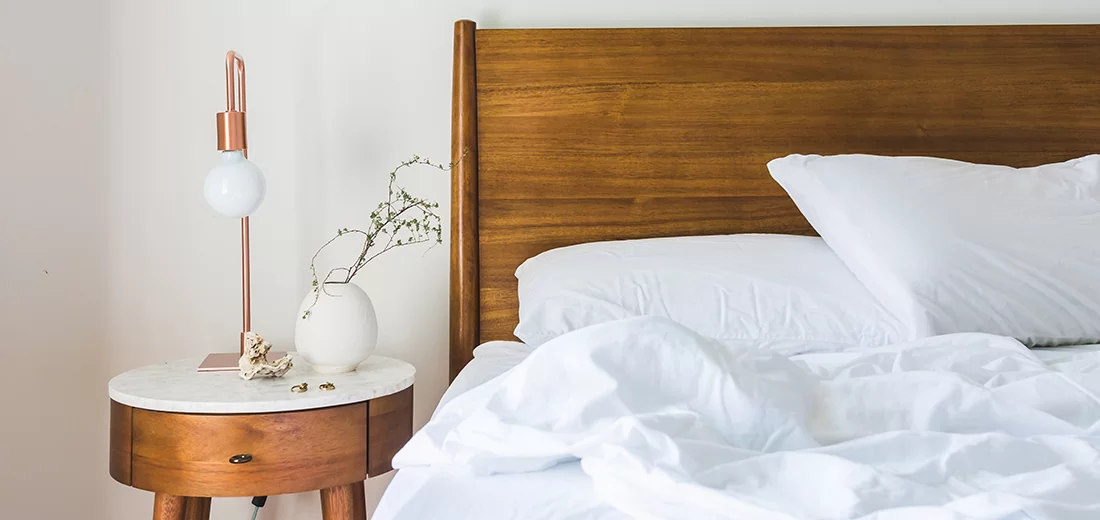A good night’s sleep is kind of like money in the bank. When we sleep well, we’re making a long-term investment in our health as we age. Studies have shown our sleeping habits have an effect not only on our energy levels[i] the next day but also out memory, metabolism and skin health in the long term.
Memory
Our memory is our link to the world, and to our sense of self. It provides us with a living record of our personal histories, a map to the way the world works, and a sense of time and place that grounds us and gives us meaning.
Investigations into the relationship between sleep & cognitive processes found that making high-quality sleep a priority during our younger years and through-out middle age could help guard against age-related cognitive decline, including problems with memory, many years later[ii][iii][iv][v].
Metabolism
Studies[vi] also show that sleep plays a vital role in regulating our metabolism and appetite. Evidence has shown a link between short sleeping patterns and an increased risk of obesity and diabetes.
If you haven’t slept well the night before you may start feeling sleepy at work, to help compensate you reach for another for another cup of coffee or a sugary drink for a quick shot of energy throughout the day. You may also find you lack the energy to go to your gym session so you skip it, or to cook a healthy meal so you grab a take-away dinner. In our world of convenience it’s harder to stick to our healthy habits when we don’t have energy to keep motivated throughout the day. Therefore, a better night’s sleep should help us avoid gaining unwanted weight by keeping us ready to take on the day ahead.
Skin
Sleep also has an effect on the moisture levels in our skin, which can cause us to appear to age faster. It has been conclusively shown that inadequate sleep is correlated with reduced skin health, as sleep deprived women show signs of premature skin ageing and even a decrease in the skins ability to recover after sun exposure[vii]. If you are concerned about the appearance of your skin, ensuring you get a good night’s sleep is a great step to keep the skin from unwanted signs of aging, alongside your skincare regime.
As mentioned above, getting a good night’s sleep can be highly beneficial for our health as we age. Unfortunately it’s not always easy to get the sort after rest. Here are four steps to help you commit to a healthy sleep routine:
- Create a sleep schedule that is consistent, and involves time for at least seven to eight hours of sleep on a nightly basis.
- Change behaviours that undermine your sleep. Whether it’s unhealthy snacking, wine every night, or staring at a brightly lit computer screen until bedtime, lifestyle choices make a critical difference to how well we sleep. Make sleep-friendly choices in your everyday behaviour and you’ll reap the benefits of sound sleep at night.
- Don’t ignore sleep problems. If you’re not sleeping well, or if you’re feeling tired during the day despite a full night’s sleep, discuss these issues with your GP. Don’t be reluctant to ask for a referral to a sleep specialist. Treating sleep problems now may help you avoid difficulties down the road.
- Consider taking a sleep supplement. When taken regularly, Nutra-Life’s Magnesium Sleep is a great way to help you fall asleep, stay asleep and wake refreshed.
[i] Sleepfoundation.org. (2018). Why Improving Your Sleep Satisfaction Can Increase Your Energy Level. [online] Available at: https://www.sleepfoundation.org/sleep-topics/why-improving-your-sleep-satisfaction-can-increase-your-energy-level-0 [Accessed 7 Jan. 2019]
[ii] Cappuccio, F., D’Elia, L., Strazzullo, P. and Miller, M. (2010). Sleep Duration and All-Cause Mortality: A Systematic Review and Meta-Analysis of Prospective Studies. Sleep, [online] 33(5), pp.585-592. Available at: https://www.ncbi.nlm.nih.gov/pmc/articles/PMC2864873/ [Accessed 7 Jan. 2019].at: https://www.ncbi.nlm.nih.gov/pmc/articles/PMC1991337/ [Accessed 7 Jan. 2019].
[iii] Knutson, K., Spiegel, K., Penev, P. and Van Cauter, E. (2007). The metabolic consequences of sleep deprivation. Sleep Medicine Reviews, [online] 11(3), pp.163-178. Available at: https://www.ncbi.nlm.nih.gov/pmc/articles/PMC1991337/ [Accessed 7 Jan. 2019].at: https://journals.sagepub.com/doi/abs/10.1177/1745691614556680[Accessed 7 Jan. 2019]
[iv] Scullin, M. and Bliwise, D. (2015). Sleep, Cognition, and Normal Aging: Integrating a Half Century of Multidisciplinary Research. Perspectives on Psychological Science, [online] 10(1), pp.97-137. Available at: https://journals.sagepub.com/doi/abs/10.1177/1745691614556680[Accessed 7 Jan. 2019]
[v] Spira, A., Chen-Edinboro, L., Wu, M. and Yaffe, K. (2014). Impact of sleep on the risk of cognitive decline and dementia. Current Opinion in Psychiatry, [online] 27(6), pp.478-483. Available at: https://www.ncbi.nlm.nih.gov/pmc/articles/PMC4323377/ [Accessed 7 Jan. 2019]
[vi] Knutson, K., Spiegel, K., Penev, P. and Van Cauter, E. (2007). The metabolic consequences of sleep deprivation. Sleep Medicine Reviews, [online] 11(3), pp.163-178. Available at: https://www.ncbi.nlm.nih.gov/pmc/articles/PMC1991337/ [Accessed 7 Jan. 2019].
[vii] Elcompanies.com. (2013). Estée Lauder Clinical Trial Finds Link between Sleep Deprivation and Skin Aging. [online] Available at: https://www.elcompanies.com/news-and-media/newsroom/press-releases/2013/7-23-2013 [Accessed 7 Jan. 2019].










